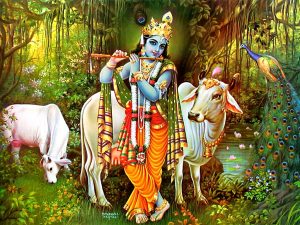Gita Jayanthi and Gita Mahatmyam
GITA MAHATMYAM
dharo uvaca
bhagavan paramesana bhaktir avyabhicarini
prarabdham bhujyamanasya
katham bhavati he prabho
1. The Earth said: O Lord! The supreme one! How can unflinching devotion arise in him who is immersed in his worldly life, O Lord?
sri visnur uvaca
prarabdham bhujyamano hi
gita abhyasa ratah sada
sa muktah sa sukhi loke
karmana no ‘palipyate
2. Lord Visnu said: Though engaged in the performance of worldly duties, one who is regular in the study of the Gita, becomes free. He is the happy man in this world. He is not bound by karma.
maha papadi papani
gita dhyanam karoti cet
kvacit sparsam na kurvanti
nalini dalam ambuvat
3. Just as the water stains not the lotus leaf, even so, sins do not taint him who is regular in the recitation of the Gita.
gitayah pustakam yatra
yatra pathah pravartate
tatra sarvani tirthani
prayaga ‘dini tatra vai
4. All the sacred places of pilgrimage like Prayaga, etc., dwell in that place where the book, the Gita, is kept and where the Gita is read.
sarve devas ca rsayo
yoginah pannagas ca ye
gopala gopika va ‘pi
narado ‘ddhava parsadaih
5. All the gods, sages, yogi, divine serpents, gopala, gopika (friends and devotees of lord Krsna), Narada, Uddhava and others (dwell there).
sahayo jayate sighram
yatra gita pravartate
yatra gita vicaras ca
pathanam pathanam srutam
tatra aham niscitam prthvi
nivasami sadai ‘va hi
6. Help comes quickly where the Gita is recited and, O Earth, I dwell at all times where the Gita is read, heard, taught and contemplated upon.
gita ‘sraye ‘ham tisthami
gita me co ‘ttamam grham
gita jnanam upasritya
trinllokan palayamy aham
7. I take refuge in the Gita and the Gita is my best abode. I protect the three worlds with the knowledge of the Gita.
gita me parama vidya
brahma rupa na samsayah
ardha matra ‘ksara nitya
sva ‘nirvacya padatmika
8. The Gita is my highest science, which is doubtless of the form of Brahman, the eternal, the ardhamatra (of the sacred monosyllable om), the ineffable splendour of the self.
cidanandena krsnena
prokta sva mukhato ‘rjunam
veda trayi parananda
tattva ‘rtha jnana samyuta
9. It was spoken by the blessed Krsna, the all-knowing, through his own mouth to Arjuna. It contains the essence of the three veda, knowledge of the reality. It is full of supreme bliss.
yo astadasa japen nityam
naro niscala manasah
jnana siddhim sa labhate
tato yati param padam
10. He who recites the eighteen chapters of the Gita daily, with a pure, unshaken mind, attains perfection in knowledge, and reaches the highest state or supreme goal.
pathe ‘samarthah sampurne
tato ‘rdham patham acaret
tada go danajam punyam
labhate na ‘tra samsayah
11. If a complete reading is not possible, even if only half of it is read, he attains the benefit of giving a cow as a gift. There is no doubt about this.
tribhagam pathamanas tu
ganga snana phalam labhet
sadamsam japamanas tu
soma yaga phalam labhet
12. He who recites one-third part of it achieves the merit of a bath in the sacred Ganga, and he who recites one-sixth of it attains the merit of performing a soma ritual.
eka adhyayam tu yo nityam
pathate bhakti samyutah
rudra lokam avapnoti
gano bhutva vasec ciram
13. That person who reads one chapter with great devotion attains to the world of Rudra and, having become an attendant of lord Siva, lives there for many years.
adhyaya sloka padam va
nityam yah pathate narah
sa yati naratam yavat
manvantaram vasundhare
14. If one reads a quarter of a chapter or even part of a verse daily, he, O Earth, retains a human body till the end of a world-cycle.
gitayah sloka dasakam
sapta panca catustayam
dvau trin ekaih tad ardham va
slokanam yah pathen narah
candra lokam avapnotii
varsanam ayutam dhruvam
gita patha samayukto
mrtomanusatam vrajet
15,16. He who repeats ten, seven, five, four, three, two verses or even one or half a verse, attains the region of the moon and lives there for ten thousand years. Accustomed to the daily study of the Gita, the dying man comes back to life again as a human being.
gita abhyasam punah krtva
labhate muktim uttamam
gite ‘ty uccara samyukto
mriyamano gatim labhet
17. By repeated study of the Gita he attains liberation. Uttering ‘Gita’ at the time of death, one attains liberation.
gita artha sravana ‘sakta
maha papa yuto ‘pi va
vaikuntham samavapnoti
visnuna saha modate
18. Though full of sins, one who is ever intent on hearing the meaning of the Gita, goes to the kingdom of God and rejoices with lord Visnu.
gita artham dhyayate nityam
krtva karmani bhurisah
jivanmuktah sa vijneyo
deha ‘nte paramam padam
19. He who meditates on the meaning of the Glita, having performed a lot of good actions, attains the supreme goal after death. Such a man should be known as a jivanmukta (sage liberated while living).
gitam asritya bahavo
bhubhujo janaka ‘dayah
nirdhuta kalmasa loke
gita yatah param padam
20. In this world, taking refuge in the Gita, many kings like Janaka and others have reached the highest state or goal, purified of all sins.
gitayah pathanam krtva
mahatmyam naiva yah pathet
vrtha patho bhavet tasya
srama eva by udahrtah
21. He who fails to read this Glory of the Gita after having read the Gita, loses the benefit thereby, and the effort alone remains.
(This is to test and to confirm the faith of the reader in the Gita. It is not a mere book but the Song of God and should therefore be studied with great faith and devotion which this Glory of the Gita generates in one’s heart.)
etan mahatmya samyuktam
gita ‘bhyasam karoti yah
sa tat phalam avapnoti
durlabharn gatim apnuyat
22. One who studies the Gita, together with this Glory of the Gita, attains the fruits mentioned above and reaches the state which is otherwise very difficult to attain.
suta uvaca
mahatmyam etad gitaya
maya proktam sanatanam
gitante ca pathed yas to
yad uktam tat phalarnlabhet
23. Suta said: This greatness or Glory of the Gita which is eternal, as narrated by me, should be read at the end of the study of the Gita and the fruits mentioned therein will be obtained.
iti sri varaha purane gri gita mahatmyam sampurnam
Thus ends the Glory of the Gita contained in the Varaha purana.

